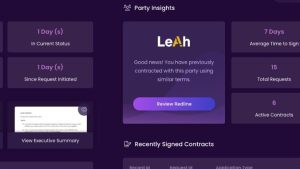
There are three core values for the framework:
- Following precedents and standardized processes and not “re-inventing the wheel” in contract negotiations with existing vendors and customers
- Measuring contract performance across core business functions and using real-time benchmarking analytics with cohort trends to improve the performance of contract management function
- Using AI technology ethically and responsibly to drive better outcomes for businesses and their ecosystem stakeholders

Sarvarth Misra, co-founder and CEO of ContractPodAi, commented, “We are excited to share the next generation of AI for advancing contract management. With Leah, our customers can drive operational excellence by delivering faster time to value and better contract governance, risk, and compliance.
“The value framework on which the AI technology operates will offer far-reaching benefits including enhanced corporate reputation by using AI responsibly to drive standardization and consistency within customers’ contracting approach to bring a more collaborative and better relationship to their supply chain.”
With Leah, ContractPodAi introduces Generative AI through integration with ChatGPT. The AI base functionality is further improved with Microsoft Azure and IBM Watson AI technology.
What is Leah
Leah is an AI-powered interface that automates many tasks that legal teams find time-consuming. The interface will drive efficiency, reduce errors and provide a more consistent approach within organisations as processes are defined and easy to follow. Interruptions are less invasive as Leah picks up the process from where it was left off. It allows the user to get back into the flow of work quickly.
Leah One Drop
Leah can initially help users with the creation of a new contract application. Using Leah One Drop, allows the user to drag the text of a contract into ContractPodAI. It creates the relevant record, ensuring that all processes are initiated for the contracting process. Leah Insights then analyses the document and highlights any known facts about it. That includes whether it is with an existing customer, and other similar contracts with known amendments that were made.
Leah Assist
Users are then presented with Leah Assist. It is an interface that provides the red lines for contracts, suggestions for changes and the ability to accept or reject changes one by one or all of them. The contract amendments can be generated by comparing previous similar contracts, the last contract with the client or previously negotiated contracts.
Users can update clauses where terms are unfavourable, tracking such changes during the negotiation phase. Where a clause needs amendment, Leah will suggest a list of previous clauses about the same subject, such as a license grant. It can also help qualitatively refine contracts or provide translations of clauses from over 65 languages. It can also translate the contract, though users should validate translations.
The main Leah dashboard provides insights across all contract negotiations, such as the average days to signature and the number of active and expired contracts.
Adding Chat GPT
The chat GPT function is Ask Leah, where users can ask questions of Leah. It will generate answers from thousands of contracts or just a single contract. Leah Deepsights provides benchmarking metrics across many of the customers on the ContractAI platform. It isn’t clear whether customers opt-in to share this benchmarking data, opt-out, or whether it is part of the solution.
Atena Reyhani, Chief Product Officer at ContractPodAi, commented, “We’re bringing Leah to market as a way to ‘demystify’ AI for legal teams, making them aware of how this technology works with, and for, them. Leah provides a very user-friendly experience when interacting with our AI, leading to increased accessibility. This improves legal teams’ day-to-day tasks, while enabling them to realize, and unlock the true value of this technology.”
Enterprise Times: What does this mean
ContractPodAi is not the first to announce generative AI functionality for its CLM platform. Last week Malbek.io also announced the release of its new Generative AI capabilities to streamline contract insights and assist with contract recommendations. In January, Agiloft launched ConvoAI, built on the Cognizer platform. Others, including Icertis, are looking to leverage ChatGPT through Microsoft Open AI.
ContractPodAI has introduced an AI assistant, Leah, enhanced with ChatGPT. It will help legal teams automate their processes and, to an extent, innovate based on existing learnings. It has not demonstrated or built ChatGPT into the contracting process. That is the next obvious step.
The question is whether lawyers will trust the clauses delivered by ChatGPT. Also, does it have the intelligence to generate new clauses that are legally binding. That is CLM’s next step, and seeing who is brave enough to announce it will be interesting.
However, even when they do, it would be wise for qualified lawyers to validate the clauses. One simple change could be for clauses created by Leah to be validated. It would allow ChatGPT clauses to be identified clearly as unvalidated.


























